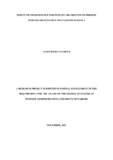| dc.description.abstract | The United Nations Economic and Social Council estimates that 650 million people or about
10% of the world‘s population as people suffering from some form of disability of whom 80%
are within developing nations. The current existing challenge is that there have never been
enough studies on the relationship between recognizing disability and promoting successful
development. The Millennium Development Goals (MDGs) call for increased focus on poverty
reduction; disability and poverty are mutually reinforcing, as disability can be a cause of
poverty and poverty can be a cause of disability. Disability affects the poverty levels of
individuals, families and society because it affects access to education, employment and
income generation. The World Bank estimates that 20% of the poorest are person with
disabilities. Microfinance has been proven to be one of the strongest anti-poverty tools; it is a
specialized field that combines banking with social goals. It is a well-known fact in Kenya
that Microfinance is an effective way to reach out to the poorest. Access to financial services
is one of the essential building blocks to achieving the Millennium Development Goals. In
Kenya we have our own vision 2030 with aspirations as those of the MDGs with a vision to
attain a globally competitive and prosperous nation with a high quality of life by 2030.
Inclusion of persons with disabilities is therefore important for the achievement of Vision 2030.
This study sought to evaluate the effect of Microfinance Institution services by Self-help
Groups of Persons with Disabilities in Kenya. The research adopted a descriptive design in
answering the research questions. Primary data was collected for a 5 year period, 2009 – 2013
from 25 respondents out of a target sample size of 35 respondents. The study reveals a
statistically significant relationship between access to MFI services and the growth of Persons
with Disabilities Self Help Groups. The study recommends those self-help groups not in a
position to receive micro-financing from institutions should look for grants from NGO‘s and
other organisations that seek to improve the wellbeing of persons with disabilities. Self-help
groups should also have a clearly defined profit sharing plan that does not affect the growth of
their businesses. The study further recommends that the groups should request small loans and
increase the amount when needed and once they have received training and experience in
running their businesses. | en_US |

